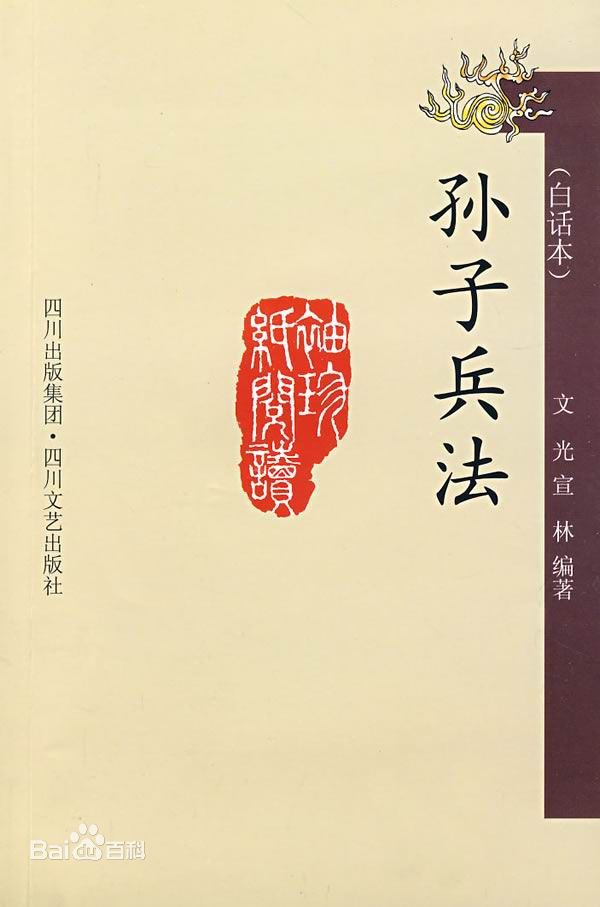Chapter 11 The Nine Situations
1. Sun Tzu said: The art of war recognizes nine varieties of ground:
(1) Dispersive ground; (2) facile ground; (3) contentious ground;(4) open ground; (5) ground of intersecting highways;(6) serious ground; (7) difficult ground; (8) hemmed-in ground;(9) desperate ground.
2. When a chieftain is fighting in his own territory,it is dispersive ground.
3. When he has penetrated into hostile territory,but to no great distance, it is facile ground.
4. Ground the possession of which imports great advantage to either side, is contentious ground.
5. Ground on which each side has liberty of movement is open ground.
6. Ground which forms the key to three contiguous states,so that he who occupies it first has most of the Empire at his command, is a ground of intersecting highways.
7. When an army has penetrated into the heart of a hostile country, leaving a number of fortified cities in its rear, it is serious ground.
8. Mountain forests, rugged steeps, marshes and fens—all country that is hard to traverse: this is difficult ground.
9. Ground which is reached through narrow gorges,and from which we can only retire by tortuous paths,so that a small number of the enemy would suffice to crush a large body of our men: this is hemmed in ground.
10. Ground on which we can only be saved from destruction by fighting without delay, is desperate ground.
11. On dispersive ground, therefore, fight not.On facile ground, halt not. On contentious ground,attack not.
12. On open ground, do not try to block the enemy's way.On the ground of intersecting highways, join hands with your allies.
13. On serious ground, gather in plunder.In difficult ground, keep steadily on the march.
14. On hemmed-in ground, resort to stratagem.On desperate ground, fight.
15. Those who were called skillful leaders of old knew how to drive a wedge between the enemy's front and rear;to prevent co-operation between his large and small divisions;to hinder the good troops from rescuing the bad,the officers from rallying their men.
16. When the enemy's men were united, they managed to keep them in disorder.
17. When it was to their advantage, they made a forward move; when otherwise, they stopped still.
18. If asked how to cope with a great host of the enemy in orderly array and on the point of marching to the attack,I should say: "Begin by seizing something which your opponent holds dear; then he will be amenable to your will."
19. Rapidity is the essence of war: take advantage of the enemy's unreadiness, make your way by unexpected routes,and attack unguarded spots.
20. The following are the principles to be observed by an invading force: The further you penetrate into a country, the greater will be the solidarity of your troops,and thus the defenders will not prevail against you.
21. Make forays in fertile country in order to supply your army with food.
22. Carefully study the well-being of your men,and do not overtax them. Concentrate your energy and hoard your strength. Keep your army continually on the move,and devise unfathomable plans.
23. Throw your soldiers into positions whence there is no escape, and they will prefer death to flight.If they will face death, there is nothing they may not achieve. Officers and men alike will put forth their uttermost strength.
24. Soldiers when in desperate straits lose the sense of fear. If there is no place of refuge,they will stand firm. If they are in hostile country,they will show a stubborn front. If there is no help for it, they will fight hard.
25. Thus, without waiting to be marshaled, the soldiers will be constantly on the qui vive; without waiting to be asked, they will do your will; without restrictions,they will be faithful; without giving orders, they can
be trusted.
26. Prohibit the taking of omens, and do away with superstitious doubts. Then, until death itself comes,no calamity need be feared.
27. If our soldiers are not overburdened with money,it is not because they have a distaste for riches;if their lives are not unduly long, it is not because they are disinclined to longevity.
28. On the day they are ordered out to battle,your soldiers may weep, those sitting up bedewing their garments, and those lying down letting the tears run down their cheeks. But let them once be brought to bay,and they will display the courage of a Chu or a Kuei.
29. The skillful tactician may be likened to the shuai-jan. Now the shuai-jan is a snake that is found in the ChUng mountains. Strike at its head, and you will be attacked by its tail; strike at its tail, and you
will be attacked by its head; strike at its middle,and you will be attacked by head and tail both.
30. Asked if an army can be made to imitate the shuai-jan,I should answer, Yes. For the men of Wu and the men of Yueh are enemies; yet if they are crossing a river in the same boat and are caught by a storm, they will come to each other's assistance just as the left hand helps the right.
31. Hence it is not enough to put one's trust in the tethering of horses, and the burying of chariot wheels in the ground
32. The principle on which to manage an army is to set up one standard of courage which all must reach.
33. How to make the best of both strong and weak—that is a question involving the proper use of ground.
34. Thus the skillful general conducts his army just as though he were leading a single man, willy-nilly, by the hand.
35. It is the business of a general to be quiet and thus ensure secrecy; upright and just, and thus maintain order.
36. He must be able to mystify his officers and men by false reports and appearances, and thus keep them in total ignorance.
37. By altering his arrangements and changing his plans, he keeps the enemy without definite knowledge.By shifting his camp and taking circuitous routes,he prevents the enemy from anticipating his purpose.
38. At the critical moment, the leader of an army acts like one who has climbed up a height and then kicks away the ladder behind him. He carries his men deep into hostile territory before he shows his hand.
39. He burns his boats and breaks his cooking-pots;like a shepherd driving a flock of sheep, he drives his men this way and that, and nothing knows whither he is going.
40. To muster his host and bring it into danger:--this may be termed the business of the general.
41. The different measures suited to the nine varieties of ground; the expediency of aggressive or defensive tactics; and the fundamental laws of human nature:these are things that must most certainly be studied.
42. When invading hostile territory, the general principle is, that penetrating deeply brings cohesion;penetrating but a short way means dispersion.
43. When you leave your own country behind, and take your army across neighborhood territory, you find yourself on critical ground. When there are means of communication on all four sides, the ground is one of intersecting highways.
44. When you penetrate deeply into a country, it is serious ground. When you penetrate but a little way,it is facile ground.
45. When you have the enemy's strongholds on your rear,and narrow passes in front, it is hemmed-in ground.When there is no place of refuge at all, it is desperate ground.
46. Therefore, on dispersive ground, I would inspire my men with unity of purpose. On facile ground, I would see that there is close connection between all parts of my army.
47. On contentious ground, I would hurry up my rear.
48. On open ground, I would keep a vigilant eye on my defenses. On ground of intersecting highways,I would consolidate my alliances.
49. On serious ground, I would try to ensure a continuous stream of supplies. On difficult ground,I would keep pushing on along the road.
50. On hemmed-in ground, I would block any way of retreat. On desperate ground, I would proclaim to my soldiers the hopelessness of saving their lives.
51. For it is the soldier's disposition to offer an obstinate resistance when surrounded, to fight hard when he cannot help himself, and to obey promptly when he has fallen into danger.
52. We cannot enter into alliance with neighboring princes until we are acquainted with their designs. We are not fit to lead an army on the march unless we are familiar with the face of the country--its mountains and forests,its pitfalls and precipices, its marshes and swamps.We shall be unable to turn natural advantages to account unless we make use of local guides.
53. To be ignored of any one of the following four or five principles does not befit a warlike prince.
54. When a warlike prince attacks a powerful state,his generalship shows itself in preventing the concentration of the enemy's forces. He overawes his opponents,and their allies are prevented from joining against him.
55. Hence he does not strive to ally himself with all and sundry, nor does he foster the power of other states.He carries out his own secret designs, keeping his antagonists in awe. Thus he is able to capture their cities and overthrow their kingdoms.
56. Bestow rewards without regard to rule,issue orders without regard to previous arrangements;and you will be able to handle a whole army as though you had to do with but a single man.
57. Confront your soldiers with the deed itself;never let them know your design. When the outlook is bright,bring it before their eyes; but tell them nothing when the situation is gloomy.
58. Place your army in deadly peril, and it will survive;plunge it into desperate straits, and it will come off in safety.
59. For it is precisely when a force has fallen into harm's way that is capable of striking a blow for victory.
60. Success in warfare is gained by carefully accommodating ourselves to the enemy's purpose.
61. By persistently hanging on the enemy's flank, we shall succeed in the long run in killing the commander-in-chief.
62. This is called ability to accomplish a thing by sheer cunning.
63. On the day that you take up your command,block the frontier passes, destroy the official tallies,and stop the passage of all emissaries.
64. Be stern in the council-chamber, so that you may control the situation.
65. If the enemy leaves a door open, you must rush in.
66. Forestall your opponent by seizing what he holds dear,and subtly contrive to time his arrival on the ground.
67. Walk in the path defined by rule, and accommodate yourself to the enemy until you can fight a decisive battle.
68. At first, then, exhibit the coyness of a maiden,until the enemy gives you an opening; afterwards emulate the rapidity of a running hare, and it will be too late for the enemy to oppose you.
原文: 【九地第十一】
1.用兵之法,有散地,有轻地,有争地,有交地,有衢地,有重地,有圮地,有围地,有死地。 诸侯自战其地者,为散地;入人之地不深者,为轻地;
我得亦利,彼得亦利者,为争地;我可以往,彼可以来者,为交地; 诸侯之地三属,先至而得天下众者,为衢地;
入人之地深,背城邑多者,为重地;山林、险阻、沮泽,凡难行之道者,为泛地;所由入者隘,所从归者迂,彼寡可以击吾之众者,为围地;疾战则存,不疾战则亡者,为死地。是故散地则无战,轻地则无止,争地则无攻,交地则无绝,衢地则合交,重地则掠,泛地则行,围地则谋,死地则战。
2.古之善用兵者,能使敌人前后不相及,众寡不相恃,贵贱不相救,上下不相收,卒离而不集,兵合而不齐。合于利而动,不合于利而止。敢问:“敌众整而将来,待之若何?”曰:“先夺其所爱,则听矣。”兵之情主速,乘人之不及,由不虞之道,攻其所不戒也。
3.凡为客之道,深入则专。主人不克,掠于饶野,三军足食;谨养而勿劳,并气积力;运兵计谋,为不可测。
投之无所往,死且不北。死焉不得,士人尽力。兵士甚陷则不惧,无所往则固,深入则拘,不得已则斗。是故其兵不修而戒,不求而得,不约而亲,不令而信,禁祥去疑,至死无所之。
吾士无余财,非恶货也;无余命,非恶寿也。令发之日,士卒坐者涕沾襟,偃卧者涕交颐,投之无所往,诸、刿之勇也。
4.故善用兵者,譬如率然。率然者,常山之蛇也。击其首则尾至,击其尾则首至,击其中则首尾俱至。敢问兵可使如率然乎?曰可。夫吴人与越人相恶也,当其同舟而济而遇风,其相救也如左右手。是故方马埋轮,未足恃也;齐勇如一,政之道也;刚柔皆得,地之理也。故善用兵者,携手若使一人,不得已也。
5.将军之事,静以幽,正以治。能愚士卒之耳目,使之无知;易其事,革其谋,使人无识;易其居,迂其途,使民不得虑。帅与之期,如登高而去其梯;帅与之深入诸侯之地,而发其机。焚舟破釜,若驱群羊,驱而往,驱而来,莫知所之。聚三军之众,投之于险,此谓将军之事也。
九地之变,屈伸之利,人情之理,不可不察也。
6.凡为客之道,深则专,浅则散。去国越境而师者,绝地也;四通者,衢地也;入深者,重地也;入浅者,轻地也;背固前隘者,围地也;无所往者,死地也。
是故散地,吾将一其志;轻地,吾将使之属;争地,吾将趋其后;交地,吾将谨其守;衢地,吾将固其结;重地吾将继其食,圮地,吾将进其途;围地,吾将塞其阙;死地,吾将示之以不活。
故兵之情:围则御,不得已则斗,过则从。
7.是故不知诸侯之谋者,不能预交;不知山林、险阻、沮泽之形者,不能行军;不用乡导,不能得地利。四五者,一不知,非霸王之兵也。夫霸王之兵,伐大国,则其众不得聚;威加于敌,则其交不得合。是故不争天下之交,不养天下之权,信己之私,威加于敌,则其城可拔,其国可隳。
施无法之赏,悬无政之令。犯三军之众,若使一人。犯之以事,勿告以言;犯之以利,勿告以害。投之亡地然后存,陷之死地然后生。夫众陷于害,然后能为胜败。
故为兵之事,在顺详敌之意,并敌一向,千里杀将,是谓巧能成事。
8.是故政举之日,夷关折符,无通其使,厉于廊庙之上,以诛其事。敌人开阖,必亟入之,先其所爱,微与之期。践墨随敌,以决战事。是故始如处女,敌人开户;后如脱兔,敌不及拒。
译文: 【九地第十一】
1、孙子说:按照用兵的原则,军事地理有散地、轻地、争地、交地、衢地、重地、圮地、围地、死地。诸侯在本国境内作战的地区,叫做散地。在敌国浅近纵深作战的地区,叫做轻地。我方得到有利,敌人得到也有利的地区,叫做争地。我军可以前往,敌军也可以前来的地区,叫做交地。多国相毗邻,先到就可以获得诸侯列国援助的地区,叫做衢地。深入敌国腹地,背靠敌人众多城邑的地区,叫做重地。山林险阻沼泽等难于通行的地区,叫做圮地。行军的道路狭窄,退兵的道路迂远,敌人可以用少量兵力攻击我方众多兵力的地区,叫做围地。迅速奋战就能生存,不迅速奋战就会全军覆灭的地区,叫做死地。因此,处于散地就不宜作战,处于轻地就不宜停留,遇上争地就不要勉强强攻,遇上交地就不要断绝联络,进入衢地就应该结交诸侯,深入重地就要掠取粮草,碰到圮地就必须迅速通过,陷入围地就要设谋脱险,处于死地就要力战求生。
2、从前善于指挥作战的人,能使敌人前后部队不能相互策应,主力和小部队无法相互依靠,官兵之间不能相互救援,上下级之间不能互相联络,士兵分散不能集中,合兵布阵也不整齐。对我有利就打,对我无利就停止行动。试问:敌人兵员众多且又阵势严整向我发起进攻,那该用什么办法对付它呢?回答是:先夺取敌人最关心爱护的,这样就听从我们的摆布了。用兵之理贵在神速,要乘敌人措手不及的时机,走敌人意料不到的道路,攻击敌人没有戒备的地方。
3、在敌国境内进行作战的一般规律是:越深入敌国腹地,我军军心就越坚固,敌人就不易战胜我们。在敌国丰饶地区掠取粮草,部队给养就有了保障。要注意休整部队,不要使其过于疲劳,保持土气,养精蓄锐。部署兵力,巧设计谋,使敌人无法判断我军的意图。将部队置于无路可走的绝境,士卒就会宁死不退。士卒既能宁死不退,那么他们怎么会不殊死作战呢!士卒深陷危险的境地,就不再存在恐惧,一旦无路可走,军心就会牢固。深入敌境军队就不会离散。遇到迫不得已的情况,军队就会殊死奋战。因此,不须整饬就能注意戒备,不用强求就能完成任务,无须约束就能亲密团结,不待申令就会遵守纪律。禁止占卜迷信,消除士卒的疑虑,他们至死也不会逃避。我军士卒没有多余的钱财,并不是不爱钱财;士卒置生死于度外,也不是不想长寿。当作战命令颁布之时,坐着的士卒泪沾衣襟,躺着的士卒泪流满面,但把士卒置于无路可走的绝境,他们就都会象专诸、曹刿一样的勇敢。
4、善于指挥作战的人,能使部队自我策应如同“率然”蛇一样。“率然”是常山地方一种蛇,打它的头部,尾巴就来救应;打它的尾,头就来救应;打它的腰,头尾都来救应。试问:可以使军队象“率然”一样吧?回答是:可以。那吴国人和越国人是互相仇视的,但当他们同船渡河而遇上大风时,他们相互救援,就如同人的左右手一样。所以,想用缚住马缰、深埋车轮这种显示死战决心的办法来稳定部队,是靠不住的。要使部队能够齐心协力奋勇作战如同一人,关键在于部队管理教育有方。要使强弱不同的士卒都能发挥作用,在于恰当地利用地形。所以善于用兵的人,能使全军上下携手团结如同一人,这是因为客观形势迫使部队不得不这样。
5、主持军事行动,要做到考虑谋略沉着冷静而幽深莫测,管理部队公正严明而有条不紊。要能蒙蔽士卒的视听,使他们对于军事行动毫无所知;变更作战部署,改变原定计划,使人无法识破真相;不时变换驻地,故意迂回前进,使人无从推测意图。将帅向军队赋予作战任务,要象使其登高而抽去梯子一样。将帅率领士卒深入诸侯国土,要象弩机发出的箭一样一往无前。对待士卒要能如驱赶羊群一样,赶过去又赶过来,使他们不知道要到哪里去。集结全军,把他们置于险境,这就是统帅军队的要点。九种地形的应变处置,攻防进退的利害得失,全军上下的心理状态,这些都是作为将帅不能不认真研究和周密考察的。
6、在敌国境内作战的规律是:深入敌境则军心稳固,浅入敌境则军心容易涣散。进入敌境进行作战的称为绝地;四通八达的地区叫做衢地;进入敌境纵深的地区叫做重地;进入敌境浅的地区叫做轻地;背有险阻前有隘路的地区叫围地;无路可走的地区就是死地。因此,在散地,要统一军队意志;在轻地,要使营阵紧密相连;在争地,要迅速出兵抄到敌人的后面;在交地,就要谨慎防守;在衢地,就要巩固与列国的结盟;入重地,就要保障军粮供应;在圮地,就必须迅速通过;陷入围地,就要堵塞缺口;到了死地,就要显示死战的决心。所以,士卒的心理状态是:陷入包围就会竭力抵抗,形势逼迫就会拚死战斗,身处绝境就会听从指挥。
7、不了解诸侯列国的战略意图,就不要与之结交;不熟悉山林、险阻、沼泽等地形情况,就不能行军;不使用向导,就无法得到地利。这些情况,如有一样不了解,都不能成为称王争霸的军队。凡是王霸的军队,进攻大国,能使敌国的军民来不及动员集中;兵威加在敌人头上,能够使敌方的盟国无法配合策应。因此,没有必要去争着同天下诸侯结交,也用不着在各诸侯国里培植自己的势力,只要施展自己的战略意图,把兵威施加在敌人头上,就可以拔取敌人的城邑,摧毁敌人的国都。施行超越惯例的奖赏,颁布不拘常规的号令,指挥全军就如同使用一个人一样。向部下布置作战任务,但不说明其中意图。只告知利益而不指出危害。将士卒置于危地,才能转危为安;使士卒陷于死地,才能起死回生。军队深陷绝境,然后才能赢得胜利。所以,指导战争的关键,在于谨慎地观察敌人的战略意图,集中兵力攻击敌人一部,千里奔袭,斩杀敌将,这就是所谓巧妙用兵,实现克敌制胜的目的。
8、因此,在决定战争方略的时候,就要封锁关口,废除通行符证,不充许敌国使者往来;要在庙堂里再三谋划,作出战略决策。敌人一旦出现间隙,就要迅速乘机而入。首先夺取敌人战略要地,但不要轻易与敌约期决战。要灵活机动,因敌情来决定自己的作战行动。因此,战争开始之前要象处女那样显得沉静柔弱,诱使敌人放松戒备;战斗展开之后,则要象脱逃的野兔一样行动迅速,使敌人措手不及,无从抵抗。
|

